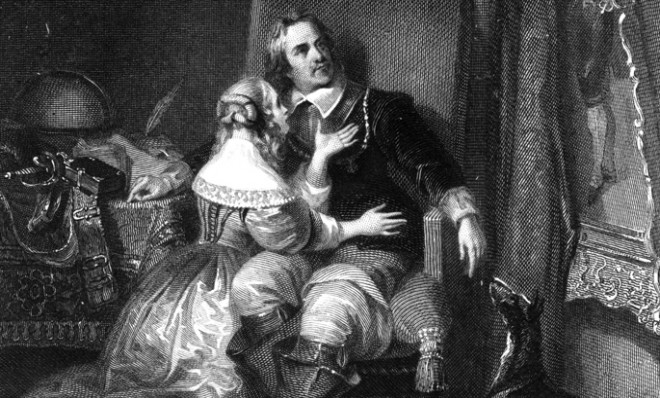5 of history's biggest killjoys
Who would declare war on Christmas, alcohol, and sex? These extremely uptight people.


A free daily email with the biggest news stories of the day – and the best features from TheWeek.com
You are now subscribed
Your newsletter sign-up was successful
1. Oliver Cromwell, (1599-1658): Stole Christmas
Technically, it wasn't Cromwell himself that stole Father Christmas from England in the 1640s. It was the government he presided over as Lord Protector. During the brief period between the execution of King Charles the First and The Restoration of the monarchy with Charles II, Christmas was forbidden.
Cromwell and the commonwealth government he led were strongly Puritan. Puritans thought celebrating such a solemn occasion as Christ's birth with feasting and parties was repugnant, and without Biblical base. They also thought that having a "Christ's Mass" sounded much too Catholic. They abolished all traditional Holy Days (holidays) except for Sunday, and set up the second Tuesday of each month as a secular day off.
The Week
Escape your echo chamber. Get the facts behind the news, plus analysis from multiple perspectives.

Sign up for The Week's Free Newsletters
From our morning news briefing to a weekly Good News Newsletter, get the best of The Week delivered directly to your inbox.
From our morning news briefing to a weekly Good News Newsletter, get the best of The Week delivered directly to your inbox.
Everybody hated it.
Cromwell died in 1658, and the Monarchy, and Christmas, was restored in 1660... at which time Cromwell's corpse was dug up, hung from chains, decapitated, and thrown in a pit with his head impaled on a pike. Because you don't mess with Christmas.
2. Carrie Nation (1846–1911): Attacked alcohol with a hatchet
It is tempting to hate Carrie Nation. This angry woman took it upon herself to forcibly free America from the vice of alcohol (decades before the U.S. government attempted the same with Prohibition). But she did it with such style! In the beginning, she would just stand outside saloons singing hymns, or greeting the bartenders as they opened up with, "Good morning, destroyer of men's souls!"
A free daily email with the biggest news stories of the day – and the best features from TheWeek.com
Then things took a turn. God apparently told her to smash all of a local saloon's stock with rocks, so she did. She entered Dobson's Saloon in Kansas on June 7, shouting, "Men, I have come to save you from a drunkard's fate!" Smashing felt right, and garnered much publicity, so she got a hatchet to do the job more effectively.
Between 1900 and 1910 she was arrested 30 times for attacking the liquor supply of saloons, administering what she called "Hatchetations."
Some historians believe it was the death of her alcoholic husband that set Carrie down the road to violently enforced temperance. Others note the strain of mental illness running in her family (both her mother and daughter spent the majority of their lives institutionalized). Carrie died in 1911, and never saw Prohibition enacted in 1920, the same year women got the right to vote. That was not a coincidence. Historians believe her campaigns paved the way for the U.S. government's attempt (and fantastic failure) to save the country from demon alcohol.
3. Will H. Hays (1879–1954): Sanitized the movies
In the 1920s, movies didn't get rated. Though most early motion picture content is incredibly tame by today's standards (if you ignore the racism and sexism and other modern-isms), contemporary viewers still found much to be offended by.
A campaign began to make it illegal to distribute any movie that didn't represent excellent morals and piety. As it was, each state had its own motion picture board that would censor each movie as they saw fit. Divorce treated lightly? Out. Gold miners drinking whiskey? Out. Too much wiggle in Clara Bow's bottom? Out. And the studio that made the movie had to pay for it; the editing, the redistribution, everything.
So Hollywood called on Will H. Hays, manager of President Harding's successful campaign, to be the new president of the Motion Picture Producers and Distributors of America. They wanted him to clean up the image of Hollywood and staunch the hemorrhage of money being paid to state censors.
He wrote rules for making clean movies, but at first, neither the studios nor the public liked them. In 1930, a group of Catholic priests presented Hays a code that one of them, Father Daniel A. Lord (who would be the REAL wet blanket here, except priests really don't count) had written. Hays thought it was perfect and implemented it.
The studios initially balked at having their art restricted. Then in 1934, under threats of boycotts and other financial woes, the MPPDA agreed to voluntarily send all films through the Hays Code censors before release. The code stayed intact until the 1960s, when modern lettered, age-appropriate ratings replaced them.
4. Thomas Bowdler (1754-1825): Purified Shakespeare
When Thomas was a boy, his father used to read the family Shakespeare. When he grew up, he realized that his father had been omitting or changing anything that was lurid. Lady Macbeth cried, "Out, crimson spot!" and Ophelia's drowning was most certainly an unfortunate accident.
And so, when Bowdler grew up, he and his sisters wrote (or rather, edited) The Family Shakespeare.
To Bowdler's credit, he did not want to remove the impurities of Shakespeare for the sake of the entire populace, just the soft impressionable minds of women and children. Still, his name became a verb, to bowdlerize: "Remove material that is considered improper or offensive from (a text or account), esp. with the result that it becomes weaker or less."
5. Anthony Comstock (1844–1915): Totalitarian dictator of sex
Anthony Comstock was the nation's self-appointed chastity belt. As a traveling salesman in New York during the mid-19th century, he was disgusted by what he saw as a society sick and degraded by obscenity and pornography. At first he just took it upon himself to be an informant, supplying information to the police so they could do prostitution busts. Then he drafted his own anti-obscenity bill, and headed off to Congress.
Comstock's law against obscenity — which prevented the printing, sale, or distribution of sexually obscene literature or devices through the mail — passed in 1873. It also banned birth control devices, as well as information about birth control or sexual health. So Americans were the only soldiers sent overseas in WWI without standard issued condoms, and any married woman who wanted legal help from her doctor to prevent constant pregnancy was told to stop having so much sex.
Comstock also founded the utterly terrifying New York Society for the Suppression of Vice, whose agents were granted the right of search, seizure, and arrest by New York state. For every bookseller they had arrested for selling obscene material (like James Joyce novels), and for every Broadway play they had shut down, they received 50 percent of the fines the violator had to pay. The society dissolved in the 1950s.
Therese O'Neill lives in Oregon and writes for The Atlantic, Mental Floss, Jezebel, and more. She is the author of New York Times bestseller Unmentionable: The Victorian Ladies Guide to Sex, Marriage and Manners. Meet her at writerthereseoneill.com.
-
 Bad Bunny’s Super Bowl: A win for unity
Bad Bunny’s Super Bowl: A win for unityFeature The global superstar's halftime show was a celebration for everyone to enjoy
-
 Book reviews: ‘Bonfire of the Murdochs’ and ‘The Typewriter and the Guillotine’
Book reviews: ‘Bonfire of the Murdochs’ and ‘The Typewriter and the Guillotine’Feature New insights into the Murdoch family’s turmoil and a renowned journalist’s time in pre-World War II Paris
-
 Witkoff and Kushner tackle Ukraine, Iran in Geneva
Witkoff and Kushner tackle Ukraine, Iran in GenevaSpeed Read Steve Witkoff and Jared Kushner held negotiations aimed at securing a nuclear deal with Iran and an end to Russia’s war in Ukraine
